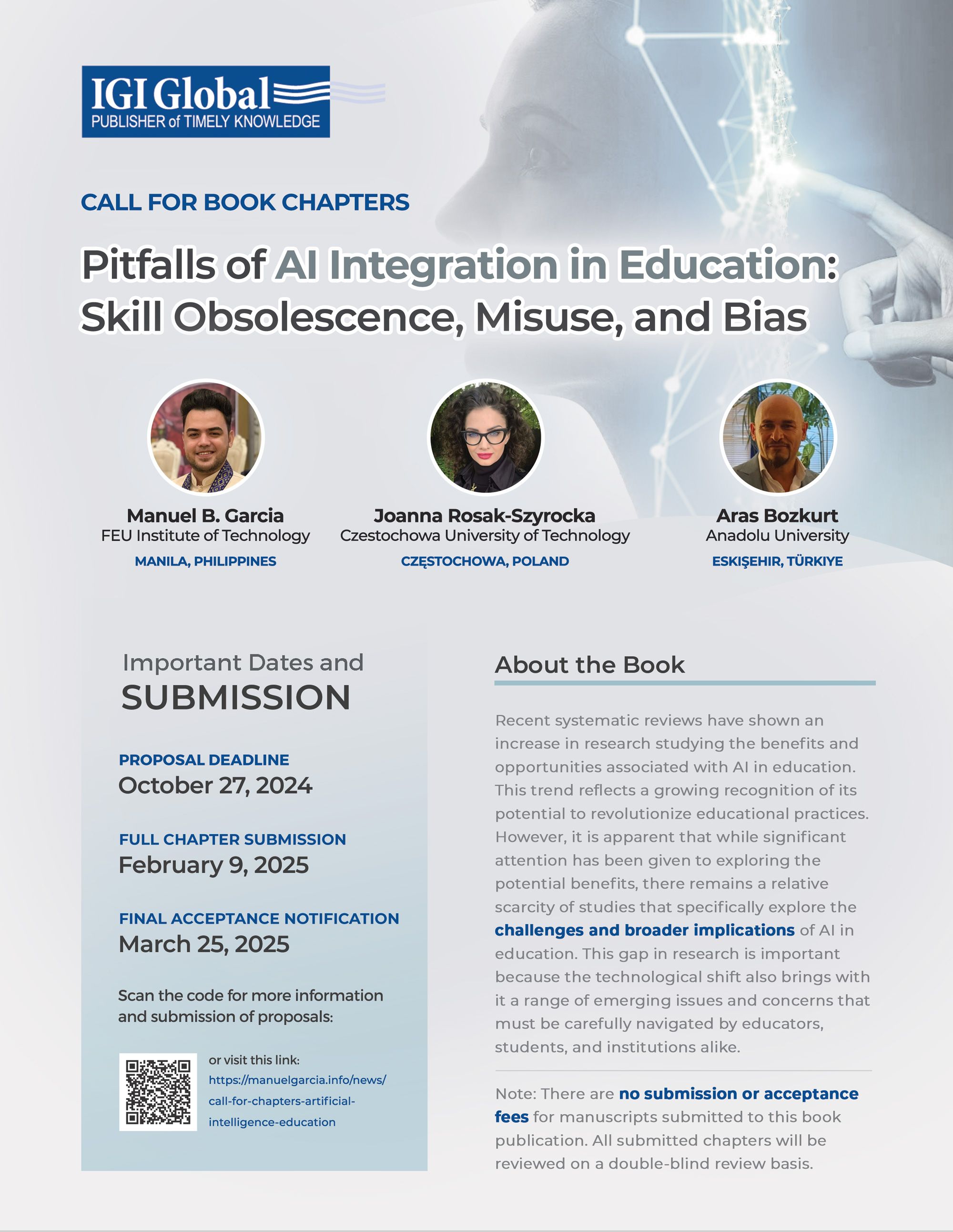Pitfalls of AI Integration in Education: Skill Obsolescence, Misuse, and Bias (Call for Chapters)
Contribute to the discourse on the challenges and ethical considerations of AI integration in education by submitting a chapter to this upcoming publication.
Introduction
The integration of Artificial Intelligence (AI) in education is rapidly transforming the teaching and learning paradigm. Recent systematic reviews have revealed a surge in research examining the efficacy, implementation, and potentialities associated with AI in education. This trend reflects a growing acknowledgment of its capacity to revolutionize educational practices. However, it is evident that while substantial focus has been devoted to exploring the prospective benefits, there remains a marked paucity of studies that critically investigate the challenges and far-reaching implications of AI in educational contexts. This gap in research is significant, as the technological shift introduces a myriad of emerging issues and concerns that must be deftly navigated by educators, students, and institutions alike. As educational institutions increasingly depend on AI to bolster academic outcomes, proactively addressing these complexities is imperative to ensure the ethical and responsible deployment of AI in education. Consequently, there exists an urgent need for studies that rigorously scrutinize these evolving challenges to inform and guide the future integration of AI within educational environments.
Objective
The Pitfalls of AI Integration in Education: Skill Obsolescence, Misuse, and Bias offers a focused and incisive exploration of the critical challenges emerging as AI becomes increasingly entrenched in educational systems worldwide. Although the adoption of AI heralds transformative benefits, this book underscores the frequently overlooked complexities and inherent risks associated with its integration. By addressing gaps in current research and practice, it dives deep into the ethical, practical, and pedagogical dilemmas confronting educators, students, and institutions. Each chapter unpacks pivotal issues, including algorithmic bias, academic dishonesty, and job displacement, offering nuanced insights into navigating these multifaceted challenges. The discussion extends beyond mere identification of problems, fostering a deeper understanding of how these elements interconnect and influence the educational landscape. By shedding light on these interconnected issues, the book invites educators, researchers, and policymakers to partake in a critical dialogue about the responsible and equitable assimilation of AI into educational frameworks.
Target Audience
This book is primarily geared towards educators, academic researchers, educational policymakers, and technology developers working within the educational sector. It is designed for those who are directly involved in the integration of AI into educational settings, whether through teaching, curriculum development, educational administration, or technological innovation.
Educators will benefit from the insights into how AI can impact classroom dynamics, teaching methodologies, and student interactions. The discussions on ethical considerations, potential biases, and the implications for skill development provide educators with the knowledge to use AI tools responsibly and effectively.
Researchers in the fields of educational technology, AI ethics, and pedagogy will find the book valuable as it addresses gaps in current research, particularly the challenges and unintended consequences of AI integration in education. By exploring underexamined areas such as algorithmic bias, academic integrity, and job displacement, this book offers a critical foundation for further academic inquiry.
Educational policymakers will gain a deeper understanding of the complexities associated with AI adoption in educational systems, including ethical dilemmas, equity concerns, and data privacy issues. This will inform policy creation, helping them establish guidelines that support responsible, equitable, and inclusive use of AI in schools and universities.
Lastly, technology developers who design AI tools for educational purposes will find the book beneficial as it highlights key areas where AI can inadvertently create obstacles or exacerbate inequalities. By understanding these pitfalls, developers can create more ethical and user-centered AI solutions that genuinely enhance educational experiences.
Overall, the book serves as a comprehensive resource for anyone invested in the thoughtful and responsible implementation of AI in education, providing a roadmap for navigating its complexities while safeguarding the core values of teaching and learning.
Recommended Topics
- Academic Dishonesty
- Assessment Validity
- AI Shaming
- Technology Dependency
- Job Displacement
- Reduced Human Interaction
- Inclusion and Equity
- Bias and Discrimination Outcomes
- Skill Obsolescence
- School Infrastructure
- Technical Knowledge
- Data Privacy and Security
- Ethics and Transparency
- Misuse of AI

Submission Procedure
Researchers and practitioners are invited to submit on or before October 27, 2024, a chapter proposal of 1,000 to 2,000 words clearly explaining the mission and concerns of his or her proposed chapter. Authors will be notified by November 10, 2024 about the status of their proposals and sent chapter guidelines.Full chapters are expected to be submitted by February 9, 2025, and all interested authors must consult the guidelines for manuscript submissions at https://www.igi-global.com/publish/contributor-resources/before-you-write/ prior to submission. All submitted chapters will be reviewed on a double-blind review basis. Contributors may also be requested to serve as reviewers for this project.
All proposals should be submitted through the eEditorial Discovery® online submission manager of IGI Global.
Publisher
This book is scheduled to be published by IGI Global (formerly Idea Group Inc.), an international academic publisher of the "Information Science Reference" (formerly Idea Group Reference), "Medical Information Science Reference," "Business Science Reference," and "Engineering Science Reference" imprints. IGI Global specializes in publishing reference books, scholarly journals, and electronic databases featuring academic research on a variety of innovative topic areas including, but not limited to, education, social science, medicine and healthcare, business and management, information science and technology, engineering, public administration, library and information science, media and communication studies, and environmental science. For additional information regarding the publisher, please visit https://www.igi-global.com. This publication is anticipated to be released in 2024.
Important Dates
- October 27, 2024: Proposal Submission Deadline
- November 10, 2024: Notification of Acceptance
- February 9, 2025: Full Chapter Submission
- April 13, 2025: Review Results Returned
- May 25, 2025: Final Acceptance Notification
- June 8, 2025: Final Chapter Submission
Editor
![]() Manuel B. Garcia
FEU Institute of Technology, Philippines
mbgarcia@feutech.edu.ph
Manuel B. Garcia
FEU Institute of Technology, Philippines
mbgarcia@feutech.edu.ph
![]() Joanna Rosak-Szyrocka
Czestochowa University of Technology, Poland
joanna.rosak-szyrocka@wz.pcz.pl
Joanna Rosak-Szyrocka
Czestochowa University of Technology, Poland
joanna.rosak-szyrocka@wz.pcz.pl
![]() Aras Bozkurt
Anadolu University, Türkiye
arasbozkurt@gmail.com
Aras Bozkurt
Anadolu University, Türkiye
arasbozkurt@gmail.com
Contribute to our Edited Book
Are you a dedicated researcher with valuable insights and groundbreaking discoveries to share? We invite you to become a part of our prestigious edited book, where your expertise will be showcased and celebrated within the academic community.

